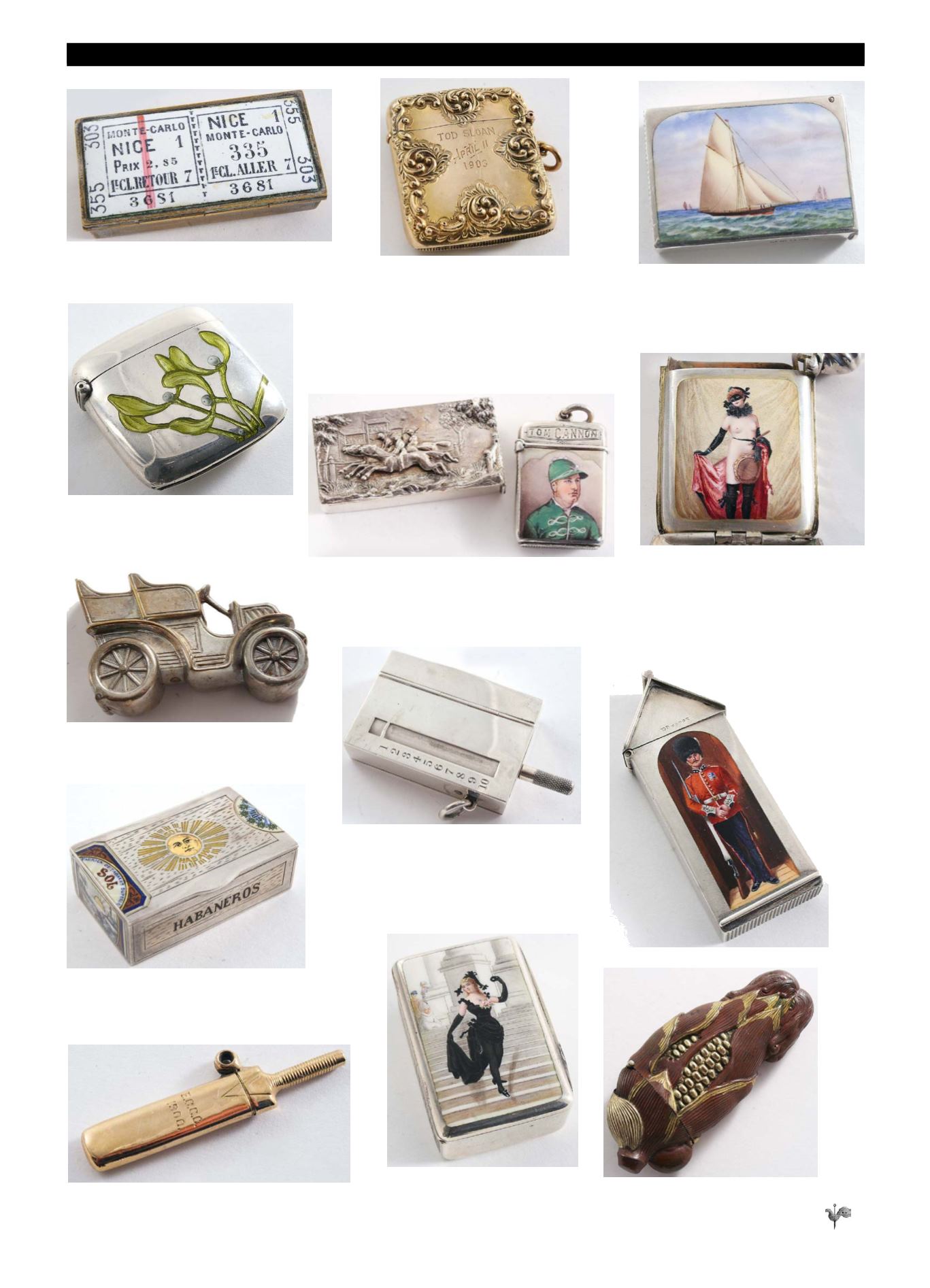

Maine Antique Digest, April 2017 9-D
-
FEATURE
-
-
Dating from 1910 or thereabouts, this nickel-plated
German vesta case takes the form of a veteran car. It
sold for $761.
Enamelled on both cover and base to resemble a first-class
return rail ticket between Nice and Monte Carlo, this French
brass vesta case from the late 19th century sold at $337.
Dating to the early 20th century and made in
Vienna, 1910-20, this vesta case by George Adam
Schied is enamelled to the front cover with mistle-
toe. It sold for $556.
“Resembling a Havana cigar box,” to quote the
catalogue description but bearing the name of a
variety of chili pepper on its side, this German
enamelled vesta case was dated to circa 1900 and
sold at $805.
The inscription on the cover of this 9k gold
vesta case with embossed and scrolled bor-
ders, and bearing the 1897 Birmingham mark
of H. Matthews, reads “Tod Sloan / April 11
/ 1903” and refers to James Forman “Tod”
Sloan (1874-1933), a famous American jockey
who rode the winners of a number of the big
race events in England, among them the 1000
Guineas Stakes and the Ascot Gold Cup. It
sold for $996.
One of the two vesta cases seen here
bears the 1881 marks of J.H. Taylor of
Birmingham and is enamelled to the front with the portrait of
another well-known flat racing jockey, Tom Cannon. It was
lotted with an 1892 Birmingham case of unknown age, reputed
to have been the jockey’s own, that has a scene of a horse race
modelled in relief on the cover. The two sold for $952.
My favourite—and always expected to do well by
the auctioneers—was this 1889 vesta case by Samp-
son Mordan of London, the flip cover enamel-deco-
rated with a racing yacht. It sold for $1464.
Catalogued as a “Naughty Nineties” model and
though bearing no maker’s mark, this vesta case
was thought to date about 1890-95. The cover with
simple diagonal fluting hinges outward to reveal
a masked dancing girl who makes a half-hearted
attempt to cover herself with an ill-positioned
cloak and tambourine. It sold for $878.
The most expensive of the
McKenzie vesta cases was this
Victorian sentry box with
enamelled decoration of a
guardsman. Bearing no
maker’s name but a reg-
istered design number,
38283, it was made in
London in 1886 and
sold for $3074.
This rare, 3" long Edwardian combined vesta case
and butt marker, incorporating a paper roll that is
visible through a slot and numbered one through
ten, bears the 1906 London mark of J.C. Vickery. It
sold for $849.
Bearing the 1896 mark of Deakin & Fran-
cis of Birmingham, this vesta case shows
a girl in a striking black dress or costume
descending or dancing her way down a
large flight of steps. It sold for $586.
The novelty vesta case in the form of a miniature gold cricket
bat, inscribed “E.C.C.C. / 1900” (for Essex County Cricket
Club?), sold for $703.
Modelled as an ear of maize or corn,
this Japanese patinated copper vesta
case with gilded highlights was dated
to circa 1900. It sold for $1347.











